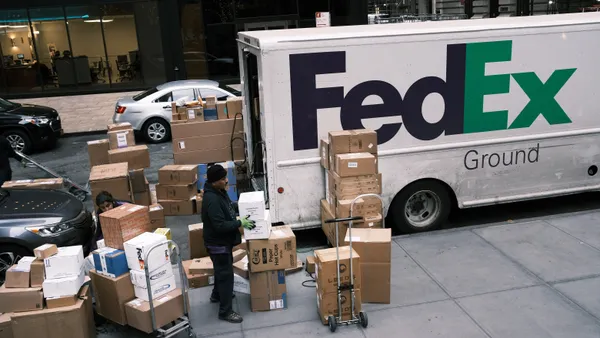Dive Brief:
- Dog toys and treats brand Bark made progress in slashing its shipping costs this past quarter as it benefited from more advantageous contracts, CFO Zahir Ibrahim said on an earnings call last month.
- The company, which owns the monthly subscription service BarkBox, saw shipping and fulfillment expenses decline $5.8 million for the quarter that ended Dec. 31. That was due, in part, to "efficiencies we have derived from more favorable shipping contracts," Ibrahim said.
- In the U.S., BarkBox delivers to customers using a combination of FedEx, the U.S. Postal Service and Pitney Bowes. Carriers have become more amenable to shipping discounts over the past year as they grapple with weak demand.
Dive Insight:
After seeing a jump in shipping rates in its 2022 fiscal year, Bark has steadily trimmed its costs tied to fulfillment and delivery as the pricing environment has become more favorable to shippers.
Co-founder, Executive Chairman and CEO Matt Meeker said in June 2023 that Bark renegotiated contracts with its "strategic shipping partners," helping lower transportation costs and limit potential surcharges. Meeker also noted in August 2023 that Bark would further trim costs by consolidating the number of carriers it uses and reducing its warehouse footprint.
"We're executing the roadmap that we laid out when I returned to the CEO role," Meeker said on last month's call. "In those two years, we improved our gross margin by 600 basis points and another 300 basis points on shipping and fulfillment."
Lower demand also factored into reduced shipping costs for Bark, as order volume fell by 5.8% for the quarter that ended Dec. 31. However, the 14% decline in shipping and fulfillment expenses outpaced that drop in demand, according to Bark's quarterly earnings report.
Bark joins shippers like Macy's and Rent the Runway in securing more favorable delivery contracts since 2023. Reduced shipping expenses recently helped other businesses improve their bottom lines as well.
Qurate Retail, owner of QVC, saw lower fulfillment expenses due, in part, to favorable rates from a new parcel carrier contract that went into effect in late July, CFO Bill Wafford said on a Feb. 28 earnings call. The multi-year agreement was with the company's primary domestic small-parcel carrier, the company previously disclosed.
Medical uniform and apparel company Figs saw selling expenses as a percent of net revenue fall by 670 basis points this past quarter due partly to "improved domestic shipping fees," according to an earnings presentation. The company uses UPS and the U.S. Postal Service for U.S. deliveries.
Editor's note: This story was first published in our Logistics Weekly newsletter. Sign up here.














